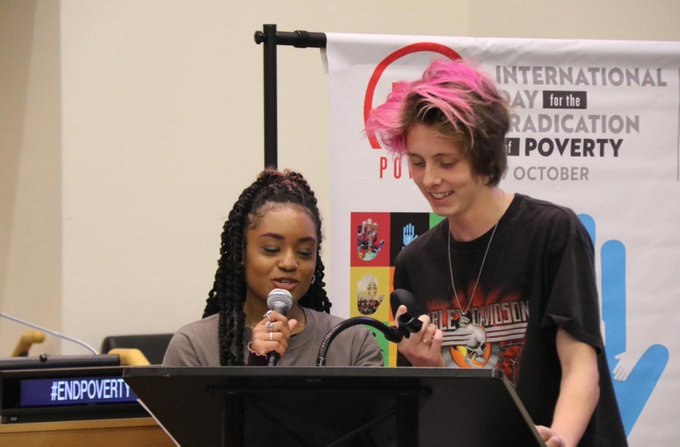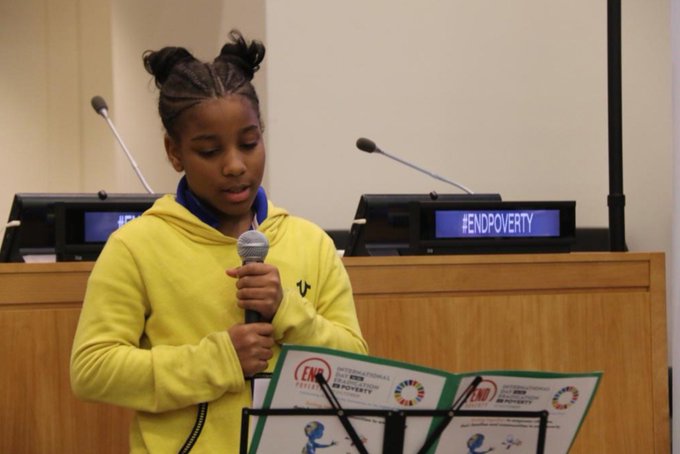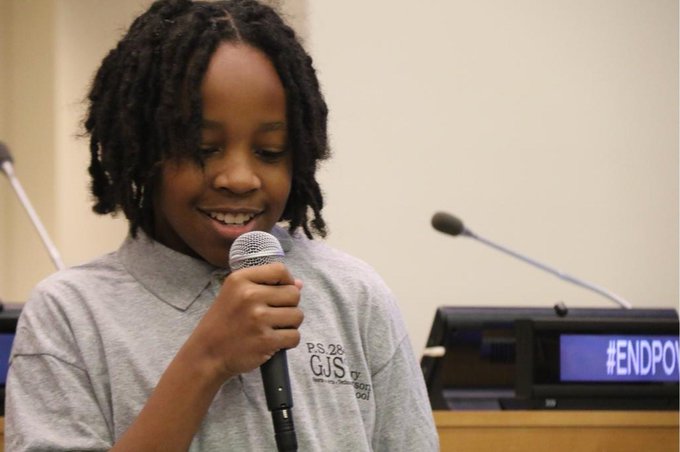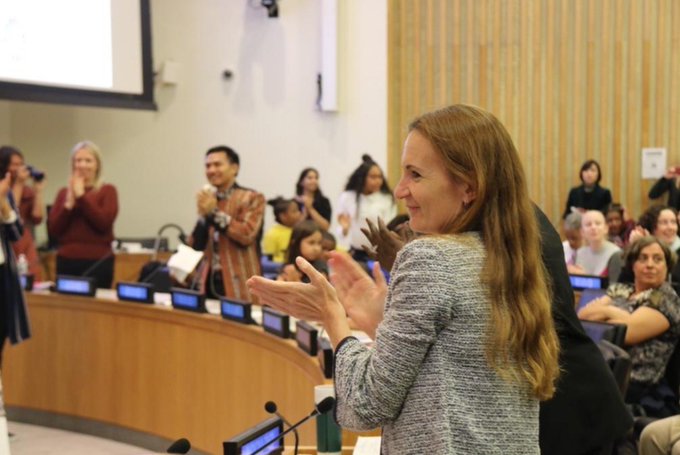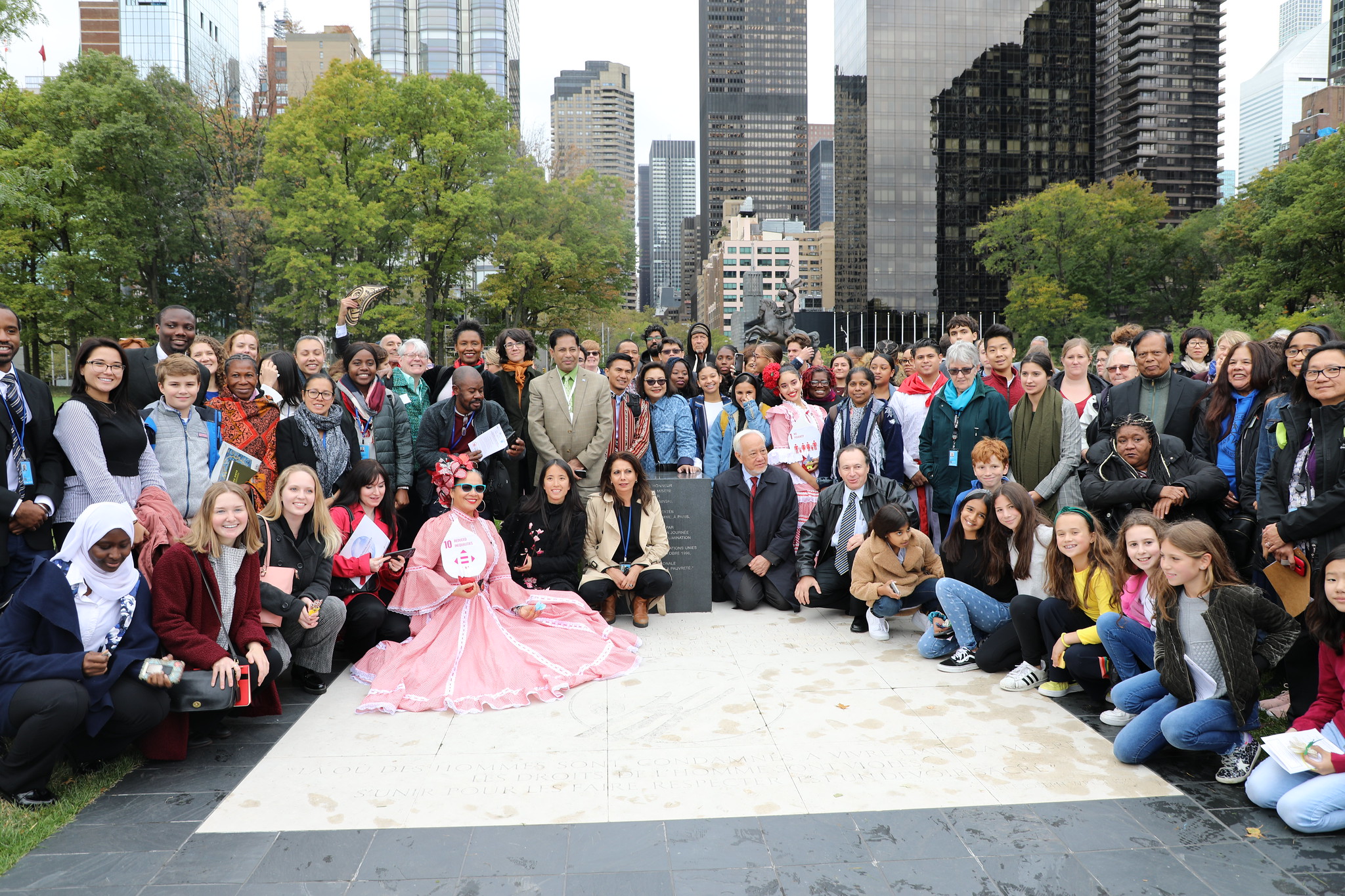
Each year on October 17, the International Day for the Eradication of Poverty, people from diverse backgrounds all over the world get together to commemorate the day and to hear people with lived experience of poverty share not only their experiences and knowledge of poverty but also their hopes, courage, and proposals for solutions to overcome it.
This year marked the thirtieth anniversary of the adoption of the Convention on the Rights of the Child, a landmark human rights treaty that sets out the civil, political, economic, social, and cultural rights of every child, regardless of race, religion, or abilities.
To celebrate this anniversary, the International Day for the Eradication of Poverty 2019 adopted the theme, “Acting together to empower children, their families and communities to end poverty.” This reminds us how crucial it is to listen to all children — especially those living in poverty and whose rights are violated — as well as to their parents and other stakeholders in the community. The day serves as a reminder that poverty cannot be eradicated without the participation and involvement of people who experience it every day.
https://twitter.com/AminaJMohammed/status/1184850693125038083?s=20
At the United Nations this year, the youthful tone of the commemoration was set by two Masters of Ceremony from the Hyde Leadership Charter School: Mr. Mark Fusco and his student Ms. Khamila Cabral.

To show their commitment to stand up against poverty, nearly two hundred children took part in the events. They inspired the whole audience with their love and energy.
https://twitter.com/GJS284/status/1184919478909493249?s=20
Ms. Daniela Bas, Director of the Division for Inclusive Social Development at the UN Department of Economic and Social Affairs, delivered opening remarks on behalf of UN Secretary General, Mr. António Guterres.
“One of the keys to ending child poverty is addressing poverty in the household, from which it often stems. Access to quality social services must be a priority, yet today, almost two-thirds of children lack social protection coverage“.

The first children to speak came from the Tapori group in Madrid, Spain. Paula, Alma, and Raquel spoke their commitment as Tapori members to improve their community by taking care of one another. They told us about the efforts children make to support their parents. Through their compelling message, they demonstrated the power children have to contribute to positive change.
https://twitter.com/UNDESA/status/1184888730114502656?s=20
Ms. Elizabeth Madden, a mother and activist from theCork Anti-Poverty Resource Network in Cork, Ireland, followed with a strong message aiming at empowering parents.
“As a parent, I believe we are role models, we need to be the change that we want to create, then and only then can we impact communities, families and others.”
In a musical interlude, the audience enjoyed an original song from the Culture Warriors, entitled “Where Does the White Dove Go When It Cries.”
Next, Mr. Hasan Azhary and Mr. Ricardo Hutahaean, community leaders from the Wadah Foundation in Jakarta, Indonesia, gave an inspiring speech to advocate for children.
“Children should be given opportunities to learn what is truly happening in their world, and opportunities to hone their skills, so that they can live using their own abilities.”
Members of the audience were invited by the Masters of Ceremony to strike a superhero pose, showing the power for caring and creating change.
Children from the Gregory Jackson School in Brownsville, Brooklyn, took the floor one by one to declare that in order to lead a happy life each child needs a family, friends, education, dreams, peace, a clean planet, care, and safety.
“Even if a family doesn’t have money, they can give love to their children. It comes out of your heart. It is something a child wants.”
The participants then enjoyed a beautiful musical performance by Ms. Julia Miranda, who sang “You’ve Got a Friend.”
After listening to children, parents, and community leaders, some Member States and United Nations representatives reacted to the messages they had heard.
Her Excellency Ms. Mariame Fofana, DeputyPermanent Representative of Burkina Faso to the UN, was touched by the children’s words and reaffirmed her Mission’s support for the commemoration and her country’s commitment to end child poverty.
Ms. Anne Gueguen, DeputyPermanent Representative of France to the UN, expressed her gratitude for “…your presence and your voices, and in particular the young voices we have heard, [which] bring much hope and encouragement.”
“As we are engaged in a race against poverty, we are now also engaged in a race against time. It is the key to achieve peaceful, inclusive and just societies that we all want our children to live in.”
Mr. David Stewart, Chief of Child Poverty and Social Protection atUNICEF, emphasized that children’s messages not only were inspiring but also have been effective in demanding leaders of government, businesses, communities, and organizations like UNICEF to do everything in their power to end children’s rights violations.
“This event […] has been so different from every other event that I go to on poverty throughout the year. It is so direct, real, and true, and I think what it must remind us is: Do not underestimate your power as individuals and together to make a difference.”
Ms. Aissata Camara, Deputy Commissioner for Operations and Strategic Partnerships at the New York CityMayor’s Office for International Affairs, concluded the indoor event by speaking of the city’s commitment to end poverty. She also gave a special recognition to all the children in the room, especially those from New York.
The commemoration continued in the UN Gardens in front of the Commemorative Stone in Honor of the Victims of Extreme Poverty, where the Karla Florez School of Dance welcomed the participants with a dance performance, “We are Cumbia. We are family” that showed the meaning of “coming together.”
After the dance, Mr. Donald Lee, President of the International Committee for October 17, recalled the origins of the commemorative stone, which was inaugurated on October 17, 1987 in Paris, France in memory of all those who have suffered and died because of the injustice of poverty. On that occasion, Joseph Wresinski issued a call to all human rights defenders who believed that, together, we could end poverty and overcome human rights abuses faced by people living in poverty. After recalling how children have always been in the forefront of the fight against poverty, Mr. Lee highlighted the importance of including them in any discussions and processes that affect their lives.
“And when we come together here today, we have to remember that children have a voice. They have a right to be heard, a right to speak, a right to be part of the decision making that affects their lives. You can’t rule them out of the equation.”

The ceremony continued with participants reading the text of the commemorative stone in the six official UN languages.
“Wherever men and women are condemned to live in extreme poverty, human rights are violated. To come together to ensure that these rights be respected is our solemn duty.”
Joseph Wresinski, 17 October 1987

Ms. Najat Maalla M’jid, the Special Representative of theUN Secretary-General on Violence against Children, delivered a powerful speech stating that “extreme poverty is one of the worst extensive forms of violence in the world and child poverty is the most brutal and unforgiving form of all poverty.”

“Ending child poverty means combatting social disparities and discrimination. Ending child poverty means ensuring equal access to decent living conditions, health, education, social services and justice. Ending child poverty means providing strong and sustainable support to families and communities where children are living and growing. Ending child poverty means inclusive participation,empowering youth and families. Ending child poverty is creating and supporting the enabling conditions under which children and young people can participate, act on their own behalf, and on their own terms”
Ms. Najat Maalla M’jid,
Special Representative of the UN Secretary-General on Violence against Children
The ceremony ended with the participants each taking a pouch of forget-me-not seeds in a symbolic gesture to remember the millions of men, women, and children who have struggled to end extreme poverty or are still struggling today.
This year’s commemoration demonstrated the importance of people acting together to empower children, their families, and communities to end poverty, and to stand in solidarity with those experiencing the violence of poverty. Only if children truly participate can their dignity and human rights be respected and a more inclusive society be achieved.
https://twitter.com/UNDESA/status/1184924740714192909?s=20
Source: ATD Fourth World
 Welcome to the United Nations
Welcome to the United Nations

